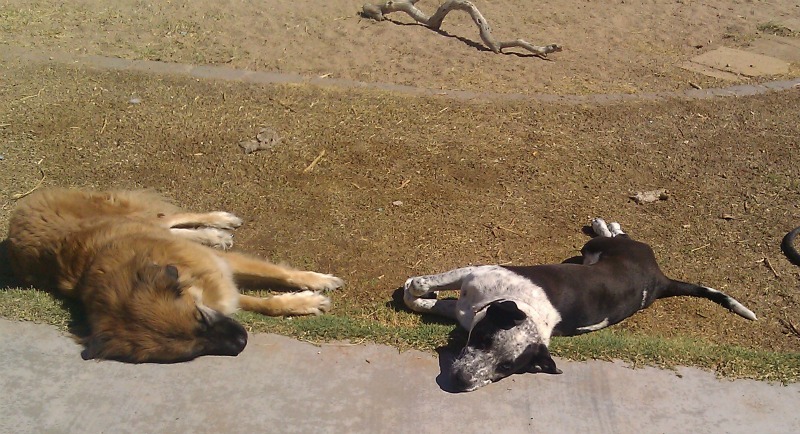Getting Old Sucks – Cognitive Dysfuntion in Dogs (CCD)
Share

 As most of you know, we have a dog who has just turned 15 years old. He’s half blind, almost completely deaf, his teeth are all filed down from fetching rocks before we got him (please don’t let your dogs fetch or eat rocks! If they do, here are some Training Tips: How to Keep A Dog From Eating Rocks), and he doesn’t play as much as he used to.
As most of you know, we have a dog who has just turned 15 years old. He’s half blind, almost completely deaf, his teeth are all filed down from fetching rocks before we got him (please don’t let your dogs fetch or eat rocks! If they do, here are some Training Tips: How to Keep A Dog From Eating Rocks), and he doesn’t play as much as he used to.
Recently, we’re seeing his age really manifest itself in different ways. He still wants to play fetch every night, but often forgets he’s playing mid-game. He’s starting to “get lost” in familiar areas of the house. If we move furniture, he becomes confused and irritated. He is more easily startled and is more reliant on “touching us” all the time. He often doesn’t respond to commands – either due to the hearing loss or CCD, we’re not sure. Walks make him really nervous and we occasionally catch him staring into space. He’s not crawling under the bed (his preferred sleeping cave) as easily as he used to (largely due to arthritis) and we’ll sometimes call his name 7-8 times before he responds.
In fact, he’s acting more like a puppy than an adult. While it’s cute on one level, it’s still a serious medical condition on another. Cheiss is exhibiting symptoms of Canine Cognitive Dysfunction (CCD).
CCD is a condition that is very similar to Alzheimer’s disease in humans. The brain actually develops lesions that look the same as those seen on the brains of humans with Alzheimer’s. It can also cause behavioral and physical changes that are a bit disturbing, including…
[heading style=”1″ color=”#996633″ style_color=”#996633″]Symptoms of CCD[/heading] [list icon=”icon: check” icon_color=”#996633″]- Becomes “trapped” in familiar areas
- Can no longer navigate or appears confused by stairs
- Has trouble finding doorways Appears withdrawn or overly sentimental
- Is easily startled by touch
- Has difficulty learning new tasks
- Paces or wanders around home
- Trembles or shakes for no apparent reason
- Frequently soils house Eats and drinks less
- Seems hesitant to take treats or try new foods
- Does not recognize people or other animals
- Becomes more aggressive or withdrawn
- Sleeps more during day, less at night
[heading style=”1″ color=”#996633″ style_color=”#996633″]Treatment of CCD[/heading]
There are a few things we can do to help Cheiss through his old age gracefully and pain-free. There is a drug available known as Anipryl® (the generic names are selegiline or L-deprenyl). This is a drug that is often used to treat Cushing’s disease (and many of the symptoms of CCD are very similar to Cushings).
However, it’s not only expensive, it has many side effects. These include vomiting, diarrhea, hyperactivity, lethargy, hearing loss, itching and shaking. Let’s face it – these are all things that Cheiss already has so I’m not going to devote another $100/mo to make these symptoms worse.
Instead, we opted for a more natural course of treatment to help alleviate pain and problems that accompany CCD. These include a daily dose of Revitamal (you can read more about Revitamal #AntiAgingPets Supplement for All Species here). This has seemed to be the most beneficial thing we’ve done. To help with his arthritis and joint pain, we began using some hemp and cannabinoid supplements (we also have him on Rimadyl and Tramadol for breakthrough pain).

The cannabinoid treats have provided the most relief and we’ve been able to completely eliminate the tramadol and reduce the Rimadyl. The cannabinoid does not give him those awful side effects either, so that’s a huge relief. We still take him in for blood work every 3 months, because we want to make sure that his liver and kidney values stay on track.
There’s no cure for CCD. It’s just a sad fact that most animals who live to old age will have signs of it. It’s not about making Cheiss living forever either. For us, it’s not about how long he’s with us, but how well his quality of life is while he’s with us. That will always be the number one thing. If we discover that the supplements are not helping, we will ask our veterinarian to help him along. That’s the worst part of having pets – they never live long enough. But, maybe that’s why they are so good at impacting our lives so quickly. They know there is limited time so they make the most of what they have.
If your dog or cat is experiencing any symptoms like the ones mentioned, it’s important to see your vet and obtain a proper diagnosis. There are many other conditions that can cause these same symptoms. For example, an acute hearing or vision loss could stem from kidney disease or infection, decreased activity could be due to arthritis or joint pain. Staring at walls could be indicative of a problem in the brain. Don’t just assume that because your dog is older, he’s experiencing CCD.

Meanwhile, you can help make life a bit easier for your senior dog. Here are some tips to help your pets navigate the wilds of aging.
[list icon=”images/Icons/Favicon/faviconpurplepaw.ico” icon_color=”#996633″]- Take them in for regular visits to your vet (at least twice yearly and more often if they have symptoms)
- Encourage play (swimming can be a great therapy for arthritic dogs)
- Purchase stairs or ramps to help your pet get to familiar place.
- Keep play sessions short. Understand your dog is not him/herself.
- Don’t push them to accept new things.
- Don’t rearrange their living space.
- Eliminate clutter on floors and around home. Keep commands short and simple.
- Be very understanding – remember that you’re not getting younger either. Keep them on a regular feeding schedule and play schedule.
- Don’t punish for accidents – often the dog does not even realize he’s had one and that results in even more confusion.
Above all, be patient and compassionate. Your dog has always been there for you – you owe it to him to be there for him.










